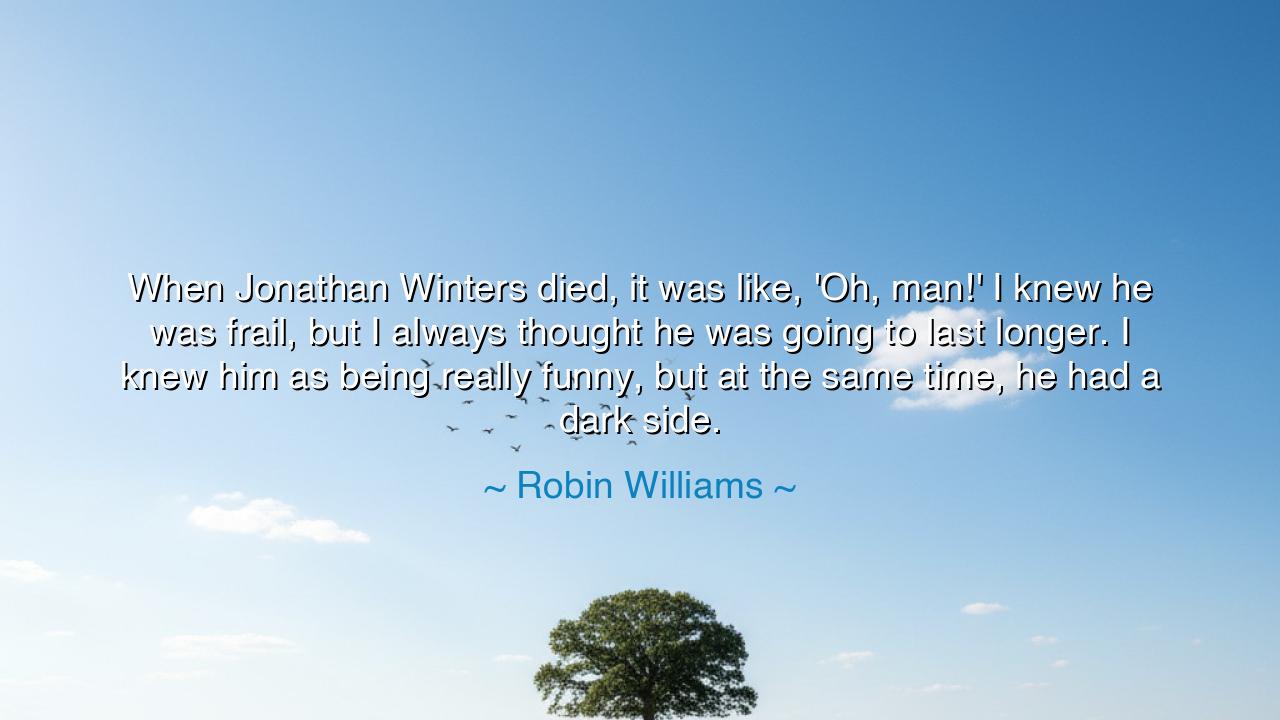
When Jonathan Winters died, it was like, 'Oh, man!' I knew he was
When Jonathan Winters died, it was like, 'Oh, man!' I knew he was frail, but I always thought he was going to last longer. I knew him as being really funny, but at the same time, he had a dark side.






In the words of Robin Williams, “When Jonathan Winters died, it was like, ‘Oh, man!’ I knew he was frail, but I always thought he was going to last longer. I knew him as being really funny, but at the same time, he had a dark side.” — there is a tenderness that reaches far beyond comedy, touching the eternal bond between two artists who understood both the light and the shadow of laughter. Beneath this simple remembrance lies a profound meditation on genius, fragility, and the dual nature of the human soul. Williams, himself a master of laughter and melancholy, speaks here not merely of the loss of a friend, but of the passing of a spirit who embodied both the glory and the grief of creativity.
The meaning of this reflection rests in its paradox: that those who bring the greatest joy often carry the deepest sorrow. Jonathan Winters, like Williams, was a being of immense imagination — a man who could summon entire worlds from silence, whose mind was a tempest of humor, energy, and chaos. Yet within that brilliance burned a kind of pain, the dark side of the artist’s gift. Williams’ words reveal an understanding born of kinship: he recognized in Winters the same duality that lived within himself — the laughter that conceals longing, the joy that walks hand in hand with despair. To be “really funny,” as Williams says, is not merely to entertain, but to bear the weight of understanding too much — to see both the comedy and tragedy of existence and make others laugh in defiance of it.
This duality has existed since the dawn of art. The ancient Greeks, who studied the soul with both reverence and fear, believed that the comic and the tragic were not opposites but twins — born of the same divine source. Aristophanes and Euripides, though writing in different forms, sought the same truth: that laughter and sorrow spring from the same well. To laugh is to resist despair; to make others laugh is to bear their pain for them. Williams’ grief for Winters is therefore not only personal but philosophical — a recognition that the laughter of great comedians is not merely noise, but a cry wrapped in music, an offering to the world to keep darkness at bay, even as it consumes the giver.
The origin of this quote lies in the sacred relationship between mentor and student, between kindred spirits separated by years but united in heart. Winters was Williams’ idol and inspiration, a pioneer of improvisational comedy who shaped the art that Williams himself would later transform. To hear of his death, then, was to feel a flame dimming — a torch passed on, yet fading. The words “I thought he was going to last longer” are not naïve; they are the lament of every artist who sees the fragility of greatness. For even the strongest voices, those that echo through generations, are mortal. Yet Williams’ remembrance ensures that Winters’ light would not vanish — it would live on in the laughter of those he inspired.
One might recall the story of the jester Triboulet, who served in the court of King Francis I of France. Triboulet was famed for his wit, his courage to speak truth through laughter. Yet when he offended the king beyond forgiveness, he was granted one mercy — the right to choose his own death. With characteristic brilliance, he replied, “I choose to die of old age.” The king, moved to laughter, spared him. Thus, humor saved him even from death — a truth both beautiful and cruel. For like Winters and Williams, Triboulet’s gift was both his salvation and his burden: the power to wield laughter against despair, knowing that behind every jest lies mortality.
The lesson we must draw from Williams’ words is not only about fame or art, but about compassion. It teaches us to look more deeply at those who make us laugh, for their brightness often hides unseen storms. When we encounter great humor, we should listen not only for its sound but for its silence — for within the pauses, there lies the truth of the human heart. And within that truth is an invitation: to be kind, to see beyond the mask, to understand that even the brightest souls need light from others.
Therefore, my friends, remember this: laughter and darkness are not enemies — they are companions in the great play of life. To laugh is to acknowledge sorrow, and to create laughter is to turn that sorrow into hope. Like Winters and Williams, we are all both fragile and fierce, carrying shadows within our light. So when you laugh, laugh fully — and when you see others laugh, honor the strength it takes to do so. For the funny, as Williams knew, are not merely jesters of joy — they are warriors of the heart, fighting darkness with the only weapon that can defeat it: the sound of shared, human laughter.
And in the end, as Robin Williams mourned his friend, he was also mourning a part of himself — the part that knows how fleeting brilliance can be. Let us, then, cherish those who make the world brighter, and when we find our own dark side rising, let us meet it not with despair, but with humor, with tenderness, and with the courage to keep creating light. For laughter, though born of fragility, is the most enduring legacy of all.






AAdministratorAdministrator
Welcome, honored guests. Please leave a comment, we will respond soon